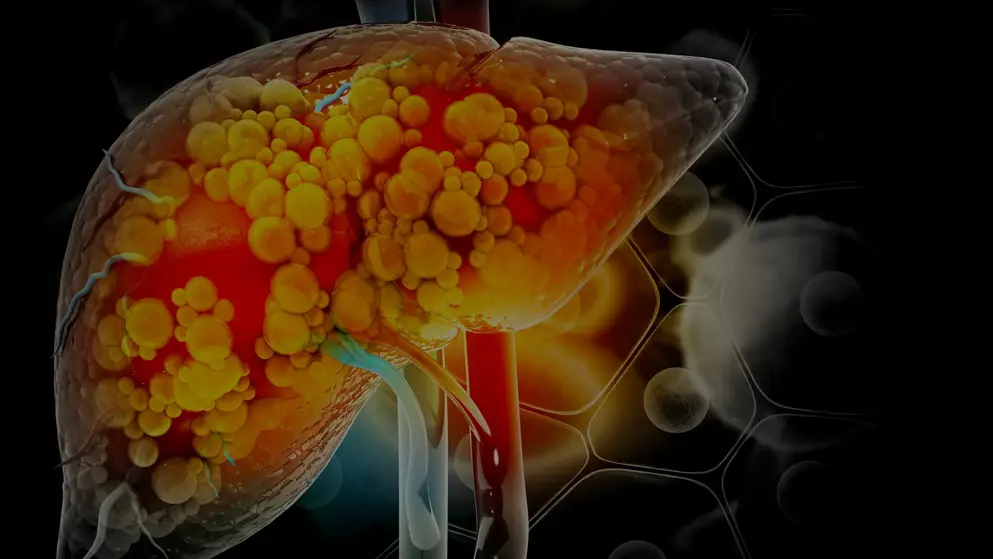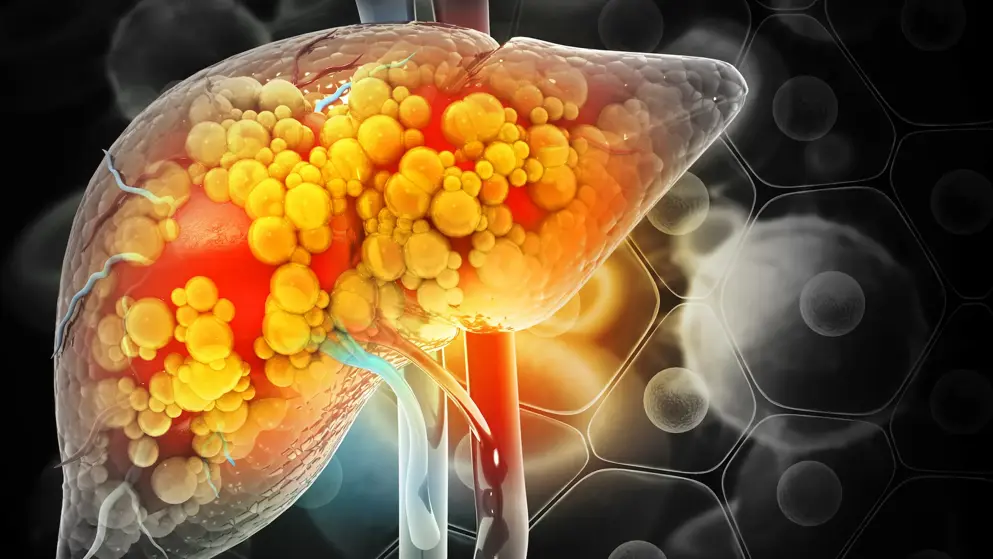
Alpha-1 antitrypsin deficiency (AATD) liver disease
Alpha-1 antitrypsin deficiency (AATD) liver disease
Alpha-1 antitrypsin deficiency (AATD) is an inherited condition that predisposes individuals to an increased risk of developing lung and liver complications from an early age1. AAT protein protects the body from the enzyme neutrophil elastase which is released from white blood cells to fight infection2. Liver disease associated with AATD is highly variable, underdiagnosed and is linked to chronic hepatitis, cirrhosis, hepatocellular carcinoma (HCC) and fulminant hepatic failure1,3.
What causes (AATD)?
AATD is caused by mutations in the SERPINA1 gene, which encodes the alpha-1 antitrypsin (AAT) protein, leading to irreversible misfolding and reduced serum concentrations of AAT4.
More than 120 SERPINA1 variants have been identified and nearly 40% of these have been associated with AATD4. When considering common variants, however, only a small number of alleles, termed M, S and Z, reach polymorphic frequency of >1%. The M alleles are considered normal and S and Z are associated with AATD4,5. The Z allele is the variant most frequently associated with liver disease4-6.
What genotype variations contribute to the risk of AATD-mediated liver disease?
Hepatocellular accumulation of misfolded AAT Z protein polymers is an established risk factor for the development of cirrhosis in people homozygous for the Z allele4,6,7. Homozygosity for the Z allele (PiZZ) is therefore considered the highest risk factor for severe and early-onset disease and is present in 95% of cases8,9.
In contrast, the risk conferred by the heterozygous Z allele genotype (PiMZ) is controversial6. It has been proposed that in individuals where a single allele is affected, intrinsic protective mechanisms can compensate for the genetic defect by removing mutant proteins, making the PiMZ genotype less of a clinical consideration than PiZZ5.
While PiMZ is considered less severe, large cohort studies have demonstrated that this genotype is also associated with a significantly high risk for developing liver disease, especially if the patient has been exposed to hepatocellular stressors such as alcohol, fatty liver, and hepatitis infection6,8. Additionally, the PiMZ genotype has a high prevalence (~35 million worldwide) and is over-represented 3-5-fold in patients with chronic liver disease1. Although only a small proportion of PiMZ individuals may develop AATD-related diseases, its high prevalence raises concerns about the potential of the PiMZ genotype to become an important public health problem, especially in individuals with a propensity for alcohol consumption and unhealthy lifestyles8.
How are patients with AATD managed?
Early AATD diagnosis and identification of high-risk genotypes are critical to optimal management9. Diagnosis of AATD can be established by measurement of the serum alpha-1 antitrypsin concentration or by genetic analysis, and it does not require liver biopsy. The gold standard for the diagnosis of AATD is the analysis of the AAT phenotype in the patient’s serum or genotype analysis of genomic DNA9,10.
How is AATD treated?
There is a great unmet need for new treatments for AATD, particularly for the more severe PiZZ genotype. Current treatment options for AATD are limited to managing lung complications through augmentation therapy which involves intravenous administration of AAT10. Currently, there are no approved therapies that address the underlying cause of AATD liver disease, with management based primarily on supportive care. Preventive strategies such as vaccination against hepatitis B and C, and alcohol avoidance/moderation have also been recommended5,7. Fazirsiran, an RNA interference therapeutic that targets mutant AAT (Z-AAT) is currently under investigation and results of a phase 2 open-label trial have been published showing a strong reduction of Z-AAT concentrations in the serum and liver and concurrent improvements in liver enzyme concentrations after treatment with fazirsiran11.
Independent, grant-supported education for Alpha-1 antitrypsin deficiency (AATD) liver disease
of interest
are looking at
saved
next event
Related news and insights
Related Clinical Trials
Related Guidelines
References
- Patel D, Teckman JH. Alpha-1-Antitrypsin Deficiency Liver Disease. Clin Liver Dis. 2018;22(4):643-655.
- Meseeha M, Attia M. Alpha 1 Antitrypsin Deficiency. StatPearls. Treasure Island (FL)2022.
- Strnad P, McElvaney NG, Lomas DA. Alpha1-Antitrypsin Deficiency. N Engl J Med. 2020;382(15):1443-1455.
- Seixas S, Marques PI. Known Mutations at the Cause of Alpha-1 Antitrypsin Deficiency an Updated Overview of SERPINA1 Variation Spectrum. Appl Clin Genet. 2021;14:173-194.
- Bouchecareilh M. Alpha-1 Antitrypsin Deficiency-Mediated Liver Toxicity: Why Do Some Patients Do Poorly? What Do We Know So Far? Chronic Obstr Pulm Dis. 2020;7(3):172-181.
- Schaefer B, Mandorfer M, Viveiros A, Finkenstedt A, Ferenci P, Schneeberger S, et al. Heterozygosity for the alpha-1-antitrypsin Z allele in cirrhosis is associated with more advanced disease. Liver Transpl. 2018;24(6):744-751.
- McElvaney GN, Sandhaus RA, Miravitlles M, Turino GM, Seersholm N, Wencker M, et al. Clinical considerations in individuals with α<sub>1</sub>-antitrypsin PI*SZ genotype. European Respiratory Journal. 2020;55(6):1902410.
- Martinez-Gonzalez C, Blanco I, Diego I, Bueno P, Miravitlles M. Estimated Prevalence and Number of PiMZ Genotypes of Alpha-1 Antitrypsin in Seventy-Four Countries Worldwide. Int J Chron Obstruct Pulmon Dis. 2021;16:2617-2630.
- Sandhaus RA, Turino G, Brantly ML, Campos M, Cross CE, Goodman K, et al. The Diagnosis and Management of Alpha-1 Antitrypsin Deficiency in the Adult. Chronic Obstr Pulm Dis. 2016;3(3):668-682.
- Miravitlles M, Dirksen A, Ferrarotti I, Koblizek V, Lange P, Mahadeva R, et al. European Respiratory Society statement: diagnosis and treatment of pulmonary disease in alpha1-antitrypsin deficiency. Eur Respir J. 2017;50(5).
- Strnad P, Mandorfer M, Choudhury G, Griffiths W, Trautwein C, Loomba R, et al. Fazirsiran for Liver Disease Associated with Alpha1-Antitrypsin Deficiency. N Engl J Med. 2022;387(6):514-524.


